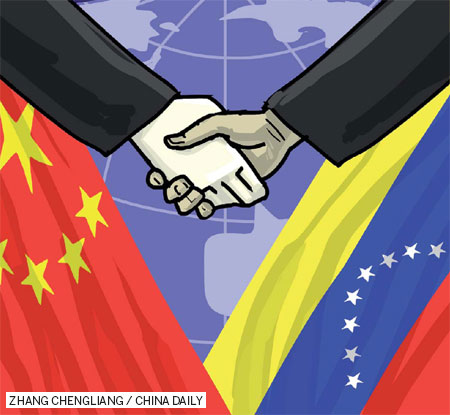Integral element of energy security
Updated: 2013-09-20 15:35
By David Gosset and Temir Porras Ponceleon (China Daily)
|
|||||||||||
Maduro visit adds new zing to China's Venezuelan ties and relationship with broader region
By choosing Trinidad and Tobago, Costa Rica and Mexico as destinations for his second foreign trip, President Xi Jinping illustrated the strategic importance of the relations between Beijing and the Community of Latin American and Caribbean States, a bloc of 33 countries representing 600 million people.
Though the economic exchanges between the US and Latin America are still much larger than China-Latin America trade, the speed of change that has characterized Sino-Latam ties is striking. Bilateral trade between China and what was often referred to as the US backyard has risen from negligible levels to more than $250 billion now.
In this rapidly evolving international environment, talks are currently underway to revive the 19th century project of a Nicaragua canal to complement the Panama conduit set up by the US a century ago. However, this time it is a Chinese company - HK Nicaragua Canal Development Investment Co Ltd - that is at the center of the discussions.
Within the China-CELAC dynamics, Sino-Brazilian, Sino-Mexican and Sino-Argentinean relations constitute intra-G20 interactions. However, the strategic partnership formed by former Chinese president Jiang Zemin and the late Venezuelan president Hugo Chavez 12 years ago, has given Sino-Latam ties a special significance.
In the six years that he was the minister of foreign affairs under Hugo Chavez, Nicolas Maduro forged strong connections with China. The charismatic inspirator of "Chavismo" visited China six times after he took office in 1999. But from Sept 21 to 24 it will be as the new leader of Venezuela that he will travel to China.
Maduro's visit has been carefully prepared by a series of high-level exchanges. In May, Li Yuanchao, China's vice-president, was in Caracas, while Venezuelan Oil and Mining Minister Rafael Ramirez visited China in June. In the following month, President of the Venezuelan National Assembly Diosdado Cabello and Jorge Arreaza, Venezuela's vice-president and the son-in-law of Hugo Chavez, held discussions in Beijing with their Chinese counterparts.
Sino-Venezuelan relations, which matter to both sides, include economic, cultural, political, military and geopolitical dimensions. Last year 15 percent of Venezuela's exports were absorbed by the Chinese market, while 17 percent of its imports came from China.
Beijing is Caracas' second-largest trade partner and Venezuela ranks fourth for China's trade in Latin America after Brazil, Mexico and Chile. Bilateral trade reached $23 billion in 2012 compared with $350 million in 2000. Beijing has provided more than $36 billion in financing to Caracas and the strategic partnership is expressed in more than 300 agreements of cooperation.
China also shares technology with Venezuela. After the VENESAT-1 Simon Bolivar satellite was supplied in 2008, Beijing recently gave Venezuela full control of a second one - the Miranda satellite, which was launched into orbit from Chinese territory last year. It is in the southern Caribbean country that Huawei, the Chinese global information and communications technology brand, established its first company store outside China.
Cooperation in infrastructure - at the Port of Cabello or in the railway sector - and in energy - three new electricity plants will be built by 2016 - also benefits the 30 million inhabitants of Venezuela.
Moreover, relations between Beijing and Caracas include military ties. Venezuela has purchased several Chinese-built Hongdu JL-8 trainer jets, also known as the Karakorum-8. A Shaanxi Y-8 military cargo plane operated by the Venezuelan Air Force recently delivered humanitarian assistance to Syrian refugees in Lebanon.
While the world's second-largest economy and a global power capable of balancing US influence in Latin America is obviously of the highest importance for Venezuela, Beijing looks also at the fourth-largest economy in Latin America strategically.
With the world's largest oil reserves - by some conservative estimates 297 billion barrels against 265 billion barrels for Saudi Arabia - Venezuela, a historic pillar of the Organization of the Petroleum Exporting Countries, is an integral element of the Chinese energy security equation.
During the first four months of this year, Caracas exported 626,000 barrels of oil a day to China. Though exports to the US were around 754,000 barrels, shipments to China are likely to go up to 1 million barrels in the next two years. Last year, Beijing purchased nearly 5.1 million barrels of oil a day from foreign markets.
Besides oil, agricultural cooperation also adds balance to bilateral relations. The fertile land in Venezuela - nearly 30 million hectares has not been fully exploited - can be better used to benefit the Venezuelan population and also provide answers to China's considerable food security challenge.
In the near future, tourism can also enrich Sino-Venezuelan links. Venezuela, known as the Land of Grace, has a highly attractive biodiversity and Caracas can evolve into a major transport hub in the Americas mirroring the role played by Miami in the north of the Caribbean Sea.
During Maduro's visit to Beijing an agreement will be signed on the establishment of a Confucius Institute in Caracas, a platform which will deepen cultural exchanges between the two regions and which could lead to more synergy in education.
The Sino-Venezuelan strategic partnership can't be separated from the broader Sino-Latin American relations. Maduro's government is already involved in the rotating presidency of MERCOSUR - the Southern Common Market among Argentina, Brazil, Paraguay and Uruguay. Venezuela, which attaches great importance to the cohesiveness of the Latin American continent, will use its position to deepen dialogue between China and MERCOSUR. In a sense, China could share the revealing MERCOSUR motto, "Nuestro Norte es el Sur" - "Our North is the South".
While the newly formed Pacific Alliance - Chile, Colombia, Mexico and Peru - has been designed to better connect with Asia, Chile and Peru have signed free trade agreements with Beijing. Caracas will work to develop its bilateral relations with the Asian giant but also to have a more autonomous South-South intercontinental dialogue between China and Latin America.
With Venezuela acting as one of the internal catalysts for solidarity among the Community of Latin American and Caribbean States and China calling for more Latin American cohesiveness, the continent is gradually coming closer to the Bolivarian dream of social progress and unity.
David Gosset is director of the Academia Sinica Europaea at CEIBS, and founder of the Euro-China Forum. Temir Porras Ponceleon is special advisor to the president of Venezuela and president of BANDES, the Venezuelan Economic and Social Development Bank. The views do not necessarily reflect those of China Daily.

(China Daily European Weekly 09/20/2013 page10)
Today's Top News
Verdict for Bo Xilai: Life in prison
Russian embassy to Syria shelled
Gunmen holding hostages in Nairobi
Amber alert across Asia, but not red
China signs 12 deals with Venezuela
Bo Xilai gets life in prison
New Sino-US ties sought
One Chinese killed in Nairobi attack
Hot Topics
Lunar probe , China growth forecasts, Emission rules get tougher, China seen through 'colored lens', International board,
Editor's Picks

|

|

|

|

|

|





